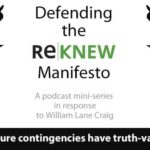We run our website the way we wished the whole internet worked: we provide high quality original content with no ads. We are funded solely by your direct support. Please consider supporting this project.
How do you respond to John 13:18–19; 17:12?
“I am not speaking of you all; I know whom I have chosen. But it is to fulfill the scripture, ‘The one who ate my bread has lifted his heel against me.’ I tell you this now, before it occurs, so that when it does occur, you may believe that I am he.’” Jesus prays to the Father, “I guard them [my disciples] and not one of them was lost except the one destined to be lost, so that the scripture might be fulfilled.”
This verse reveals that by the time Jesus made this statement Judas was “destined to be lost.” But neither this nor any other verse states when Judas became “destined” to be lost. I see no reason to think it was prior to the time when Judas, of his own free volition, irrevocably resolved it in his heart to turn against God. Scripture teaches us that there is a point when God sees that it is useless to strive with people any longer. He thus withdraws his Spirit from these people, hardens their heart, and determines their destiny (e.g. Gen. 6:3; Rom. 1:24–27). When this occurs the only remaining question is how God can strategically use the wickedness of these people to further his divine plans.
By virtue of his own wickedness Judas had apparently put himself in this position. The fact that Judas’ betrayal fulfilled scripture does not mean that he was the one who had to fulfill scripture.
In fact, it doesn’t seen that anyone had to betray Jesus to “fulfill” Scripture. The passage that Judas “fulfills” is Psalm 41:9, in which David complains that a “close friend” who “shared my bread” has “lifted up his heel against me.” There is clearly nothing predictive about this passage. If no one had betrayed Jesus, no one would be sitting around wondering why Psalm 41:9 wasn’t “fulfilled.” Consider that in the previous sentence David complained that people were saying he was going to die from a “vile disease” (41:8). People never said this about Jesus, yet no one worries that Psalm 41:8 wasn’t “fulfilled.”
When Jesus (or a Gospel author) says that an event “fulfills” an Old Testament passage, they don’t necessarily mean that the event was predicted by the Old Testament and that the event had to occur. What they often mean is simply that the event illustrates in a superlative way a principle found in the Old Testament passage. The event didn’t have to occur, but once it occurs, or once it becomes certain to occur, it takes on retroactive significance by being interpreted through the lens of an Old Testament passage. Judas’ betrayal of Jesus thus “fulfills” Psalm 41:9 in the sense that it is the supreme illustration of a betrayal of God’s servant. As a friend betrayed David, so Judas betrayed the Son of David.
This use of the term “fulfilled” may sound odd to modern western people, but it would not have sounded odd to first century Jews. It was a form of Bible interpretation called “midrash” that helped Jews interpret current events in light of Scripture.
Category: Q&A
Tags: Open Theism, Q&A
Topics: Open Theism, Responding to Objections
Verse: John 13, John 17
Related Reading

What is the significance of 1 Samuel 15:10?
In light of Saul’s sin the Lord says, “I regret that I made Saul king, for he has turned back from following me.” Common sense would suggest that one can only regret a decision one makes if the decision results in an outcome other than what was expected or hoped for. If God foreknows all…

What is the significance of Judges 2:20–3:5?
The Lord did not provide any assistance in Israel’s battles, “In order to test Israel, whether or not they would take care to walk in the way of the Lord as their ancestors did” (vs. 22). The pagan opponents of Israel “were for the testing of Israel, to know whether Israel would obey the commandments…

What is the significance of Jeremiah 18:7–11?
The Lord states that “if that nation, concerning which I have spoken, turns from its evil, I will change my mind about the disaster that I intended to bring on it.” But if a nation which he has declared he will bless “does evil in my sight…I will change my mind about the good that…

Podcast: Defending the Manifesto (6 of 10)
Greg responds to challenges by William Lane Craig from Craig’s podcast “Reasonable Faith.“ Greg denies Molinism and discusses the logic of possibility. http://traffic.libsyn.com/askgregboyd/Episode_0061.mp3

Is the Bible against body piercing and tattoos?
Some Christians argue against body piercing and tattoos on the basis of a couple of Old Testament verses that prohibit them (Lev. 19:28). Several years back an aggravated lady tried to get me to preach against these things in my church (she’d observed that a number of people in the congregation had body piercings and…

What is the significance of Joel 2:13–14?
“Return to the Lord your God, for he is gracious and merciful, slow to anger, and abounding in steadfast love, and relents from punishing. Who knows whether he will not turn and relent, and leave a blessing behind him…?” As we have seen, God’s willingness to alter his course of action—even after he’s prophetically announced…
